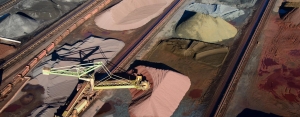


(Posted on 04/08/25)
Throughput in the port of Rotterdam decreased by 4.1% in the first half of 2025. This brought the total throughput to 211.0 million tonnes. The largest decline was in dry bulk (-8.9%) and liquid bulk (-5.3%) segments. Container throughput showed growth of 2.7% in TEU.
In terms of tonnage, the container segment showed a decline of 1.0%. The lack of investment in the industry by the market is a cause for concern for the Port Authority. Although the government has taken positive steps recently to bring the playing field for Dutch industry more in line with that of neighbouring countries, additional measures are necessary. The announced closure of a number of chemical companies, and with it the loss of hundreds of jobs in the first half of 2025, confirms these concerns. The Port Authority’s financial results and investments show stable development.
The throughput of dry bulk cargo has fallen by 8.9% this year. The throughput of agribulk rose by 18.6%. This segment is always strongly influenced by global demand and harvests. In the first few months of this year, there was a sharp increase in imports of oilseeds such as soybeans, soybean meal, and rapeseed. This led to a sharp increase in Dutch imports. The supply of iron ore and scrap fell by 12.2%. This is linked to lower production in the German steel industry which is influenced by ongoing economic uncertainty and trade restrictions. Coal throughput decreased by 21.1%. This was mainly due to lower supplies of coking coal, which is used in blast furnaces for steel production.
Boudewijn Siemons, CEO of Port of Rotterdam Authority: “In recent months, we as a port have been confronted with economic uncertainties, lagging investments, and disruptions in supply chains. In these turbulent times, as a port, we must ensure that the security of supply of energy, food, and other essential materials in Europe remains guaranteed. It is also very important that industry in the port remains competitive so as not to weaken Europe’s strategic autonomy.”
Despite the challenging economic conditions, a large number of projects are underway to create a future-proof port with net zero CO2 emissions by 2050. The construction of infrastructure is necessary for making society and industry more sustainable. Much progress has been made in this area during the first half of the year, including continuing construction of the Porthos CCS project. The construction of the land pipeline has been completed and work has now started on the offshore infrastructure. The former gas production platform in the North Sea is being converted for the injection of CO2 for permanent storage in gas fields under the North Sea. Porthos is expected to be operational in 2026.
Abu Dhabi based AD Ports Group, a global enabler of integrated trade, transport, industry, and logistics... Read more
This year marks a significant milestone in maritime innovation as Port Hedland, Australia, celebrates... Read more
Associated British Ports (ABP), the UK’s leading port operator, has announced the latest tranche... Read more
During the Investment, Labour, and Trade Promotion Programme in Japan (November 16–22, 2025),... Read more
AD Ports Group subsidiary Khalifa Economic Zones Abu Dhabi - KEZAD Group, the largest operator of integrated... Read more
Abu Dhabi based AD Ports Group, a global enabler of integrated trade, transport, industry, and logistics... Read more
Peel Ports Group has achieved a 48% reduction in operational greenhouse gas emissions in the last five... Read more
The Trois-Rivières Port Authority (TRPA) in Canada has announced the appointment of Mr. Anick... Read more
Euroports commitment to continuously improving operational efficiency, enhancing workplace safety, and... Read more
Under the slogan ‘Your Intermodal Link Between China, Iberia and the Atlantic Markets,’... Read more